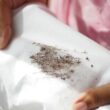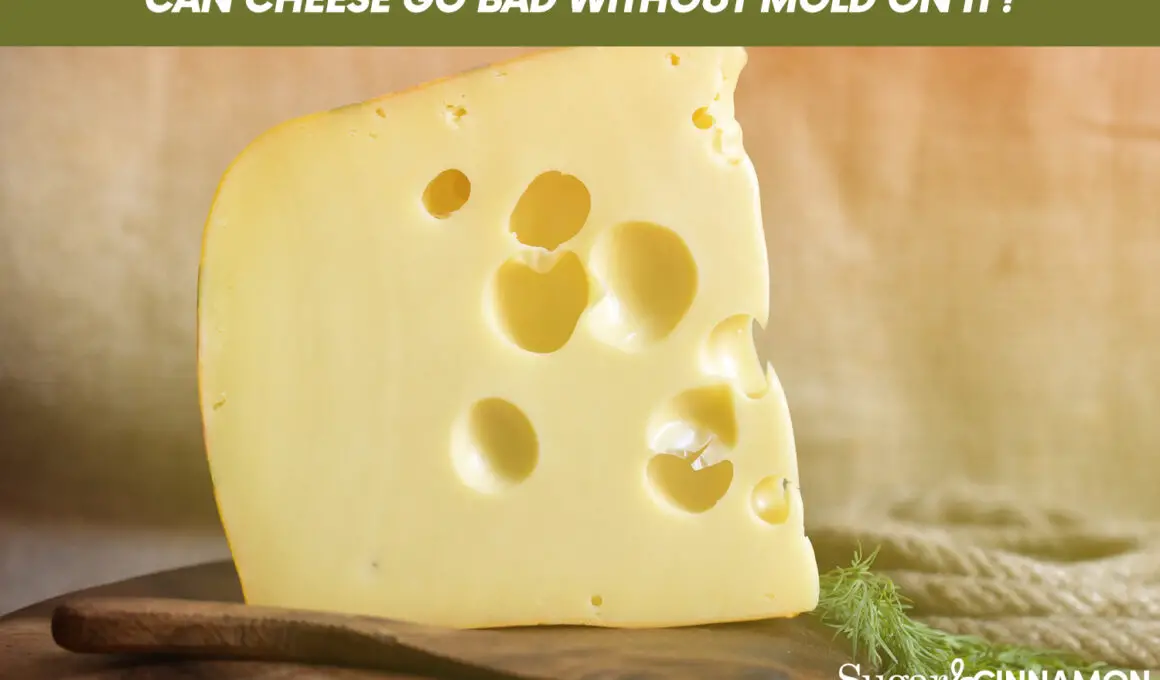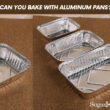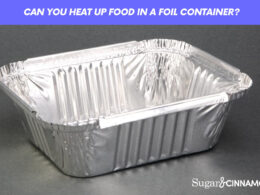Table of Contents Show
Cheese is one of the most popular dairy products, and it comes in a wide range of flavors and varieties generally. There is quite a bit of concern about how to store and preserve all varieties of cheese.
Cheese is pretty much on the list of American’s famous dairy products but while their overpowering smell is considered okay and normal, it is also a reason to learn about cheese life span.
In summary, Yes, cheese can go bad without any mold on it. Mold is not the only thing that indicates if the cheese has gone bad or not. Aging and cheese tend to go hand in hand and some varieties of cheese won’t be cheese without mold on it. Properly aged cheese is however different from expired cheese so if mold is found on cheese that is not supposed to have it then this can mean it is expired. When your cheese also shows heavy mold growth, it’s time to discard it.
With so many varieties of cheese out there, it is very easy to forget they are processed the same way. Each cheese has its own best before date. Cheese is a great source of protein and not only is it healthy but has been part of the human diet for centuries which is another reason to have it in your kitchen.
How you can keep cheese fresh even after its expiry date can come in handy and save you from tossing out your forgotten cheese. However, if you find some mold on them, then you should read on to find out if it is safe to consume and how to preserve it.
Mold Growing On Food Explained
Mold is simply a fungus that can establish and thrive as a result of a moist and damp environment. It grows in the form of a multicellular filament called hyphae and in contrast, fungi can adopt single-cell growth which is the yeast. The growth of mold on any food item often results in a fuzzy appearance or discoloration.
The common sources of mold on any food have been discovered to be exposed to moisture or high interior humidity. Mold can lead to food spoilage, but it only covers the surface and can’t penetrate deep into dense or hard foods. But if the food is completely covered with mold then you have to discard it.
If you find mold on food or anywhere, do not sniff it as this phase has been discovered to cause respiratory problems.
Molds can also cause some allergic reactions, but it should be safe to cut the affected part off your food and eat it. But foods like bread are better thrown away as they will only continue to grow.
Can Cheese Go Bad Without Mold On It?
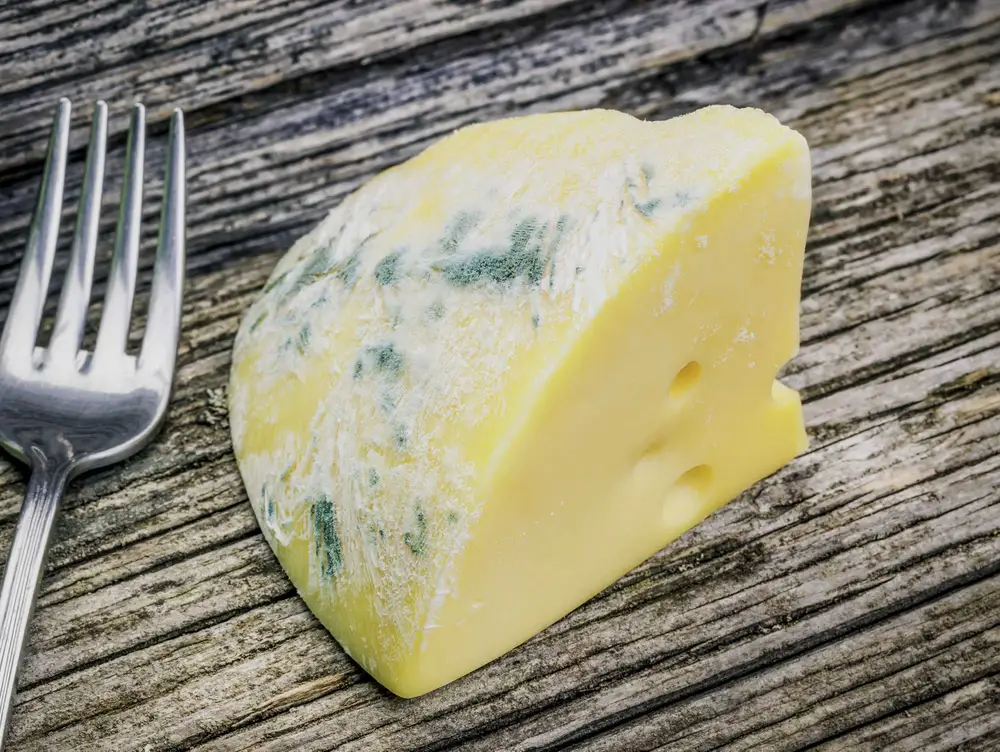
First, note that mold is considered normal on some cheese, but not all, and only some parts are okay to have mold which you can cut off but if all your cheese is covered with mold then you have to throw it out.
Some varieties of cheese use mold to show it is aging, but this doesn’t mean your cheese has gone bad. If a hard cheese is sporting mold then you simply have to cut it off, but a soft cheese has to be discarded.
Mold on cheese does not necessarily mean it has gone bad rather it majorly has to do with the type of mold and cheese. You can cut a mold off cheese if it hasn’t spread to the whole part since molds can’t penetrate deep but if mold is seen on a soft cheese then you should have it tossed out.
Mold on soft cheese is hard to get rid of, and it often shows your cheese is completely contaminated. While cheese is great, it is not worth getting food poisoning over hence you need to know when it’s okay to have mold on it and when it has to be chucked away.
Learning how to keep your cheese fresh as long as possible will save you from having to cut cheese off it or even worrying about it going bad in the first place. Cheese is meant to last a long time, but mold is not the only sign that shows cheese has gone bad.
How Can You Tell If Cheese Is Bad?
While mold on cheese is the first indicator that cheese has gone bad, it can also have a really bad smell which can come way before mold starts to spread.
The best before dates on your cheese is not exactly reliable, so the smell is one thing you have to look out for, when cheese goes bad, the smell can become overpowering and bad.
Cheese tends to taste like spoiled sour milk when it’s spoiled. Mold-on hard cheese can still be cut off but if it smells really bad then it means it’s not safe to consume anymore. Mold on soft cheese can’t be salvaged, toss the entire content out.
How to Keep Cheese Well Preserved and Fresh
Proper storage can keep it fresh longer after its expiration date. Cheese is one of the most loved foods which is why you also need to learn how to preserve your favorite food.
The flavor of most cheese will get stronger as it ages, but this also depends on your storage process. It doesn’t matter the variety of dishes or if it is simply an imported variety of cheese, below are different ways you can preserve them.
| Cheese Preservation Method | Process |
|---|---|
| Preserve in the refrigerator | Double wrap cheese and place where the temperature is highly constant or put in a container lined with a damp cloth before placing it in the fridge at the top. |
| Cheese paper or bag | Wrap in cheese paper or bag to seal in moisture and store on your kitchen counter. Double wrapping on the outside is also recommended. |
| Wrapped in wax paper | Wax paper is nonstick and water-resistant so in place of the cheese paper, use this to wrap your cheese and store it in the fridge or on the counter. |
| Sugar cubes | Place cheese in a lidded container or plastic and place one or two sugar cubes. Replace the sugar cubes when they start to turn soft. |
| Water | Cheese like mozzarella or feta does come packed in brine or water so to maintain their shelf life, keep them in water. Change the water every 2 to 3 days. |
| Parchment paper | Wrap cheese in parchment paper and place it in a partially sealed plastic bag. |
| Use oil | Coat your cheese lightly with oil such as canola oil or vegetable oil then store in an airtight container. |
Frequently Asked Questions
How can you tell if cheese is spoiled?
To know your cheese is spoiled, you will spot mold all over its body however hard cheese might spot mold on one part of its body, but this doesn’t mean it’s spoiled. Sniff your cheese if it smells like spoiled sour milk then this means it is bad. A good deal of cheese has a really strong smell but will only smell like feet or spoiled milk when it’s bad.
Can you eat expired cheese if it’s not moldy?
Expired cheese with mold all over it have to be discarded however if there is only one little mold growing, it is safe for you to cut that away and consume it. Cheese generally lasts way past its expiry date but if it smells weird or develops mold all over, toss it out.
Does bad cheese always have mold?
Cheese like blue and soft-ripened cheese is grown with specific mold on them, so mold doesn’t exactly mean your cheese has gone bad unless it has spread. If mold is found on cheese such as shredded, soft, or crumbled varieties, throw them out.
Can old cheese make you sick?
Old cheese poses no threat in certain cases and if molds haven’t been found on it. Molds can carry harmful bacteria and even after cutting that part off, you can still get sick from it. Look for any visual cues like yellow splotches or a weird smell on your cheese to indicate it is going bad or aging, if this is found, it is best not to eat it.
Final Thoughts
Cheese is one of the foods whose expiry date is not exactly considered normal.
With the right storage method, you can enjoy cheese even after its expiry date and surprisingly, the cheese will be okay stored on your kitchen counter provided it is wrapped, and some cheese does not need to be refrigerated.
So, in conclusion, your hard cheese can be salvaged if it has mold on one spot, but if this is found on soft cheese, throw it out.





